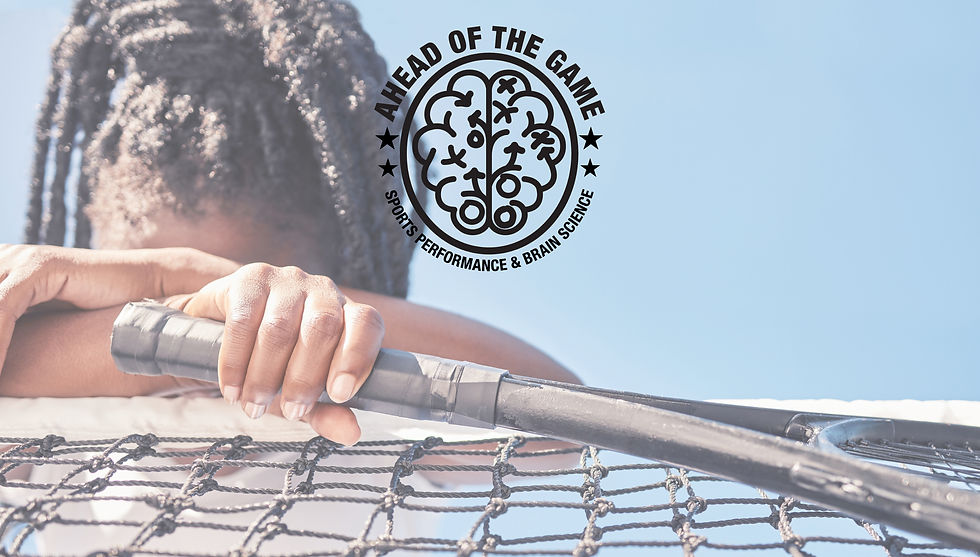Embrace Mental Training
- Marcus Brewer

- Oct 18, 2024
- 3 min read
Updated: Sep 23, 2025
For many athletes, mental training remains an untapped resource for improving sports performance. Some may not fully understand what it entails or may be skeptical of its benefits. Here’s how parents can help their kids embrace mental training.
Even if you, as a parent, recognize the importance of mental toughness for your young athletes, they may resist it. If kids don’t “buy in” to mental training, they won’t experience its benefits. In this article, we offer guidance for sports parents and coaches on how to encourage kids to develop a strong mental game, as well as explore the mindsets that hold athletes back from embracing mental training.
Some parents point to a lack of clear communication from coaches about what mental toughness is and how to develop it. One parent asked, “How can I get my child to consider working on her mental game? She feels it's too much pressure.”
Many athletes don't realize that mental game resources are available. When performance declines, athletes often first look to change coaching, equipment, or strategy, not realizing that the real issue may be mental. We encourage parents and coaches to proactively teach kids mental skills early, rather than waiting for performance issues or mental blocks to arise.

How Can Parents Introduce Mental Game Skills?
Start by offering examples of young athletes with strong mental skills. For instance, a basketball player who keeps shooting despite early mistakes, or a hockey player who stays focused amidst cheering fans. A golfer might react calmly after missing a short putt. Many elite athletes work with mental coaches to handle pressure, boost confidence, and maintain focus.
Top 10 Myths That Prevent Athletes from Embracing Mental Training:
"I’m already mentally tough." Some athletes believe they don't need mental training because they’re already tough. In reality, mental training helps athletes fine-tune their mental game and stay resilient under pressure. Even the mentally toughest athletes can benefit from a refresher.
"My teammates or coach would think I’m weak if I needed mental training." Mental training isn’t a sign of weakness—it’s an opportunity to improve. Athletes show strength when they acknowledge the need to work on their mental game and commit to self-improvement.
"If my coach doesn’t value mental training, why should I?" Even if a coach doesn’t emphasize mental training, athletes can still benefit. Educate your child’s coach by sharing articles or resources on the value of sports psychology. Explain the benefits, like improved focus, confidence, and resilience.
"I’m playing well now and don’t want to mess up my momentum." If athletes are performing well, it’s an ideal time to work on their mental game. They can become more aware of the thoughts and feelings that contribute to their success, helping them maintain momentum and perform consistently.
"Performing well is all about hard work, not mental stuff." Hard work is critical, but mental resilience is key when things don’t go as planned. Mental training equips athletes to handle distractions, adversity, and other challenges that arise during competition.
"I don’t want my opponents to know I need mental help." Some athletes worry their opponents will use their mental challenges against them. Mental coaches maintain confidentiality, and discussions about mental training stay within the family or team.
"My coach would bench me if he knew I was struggling mentally." Coaches appreciate athletes being honest about their mental struggles. Mental training enhances performance, increasing athletes’ chances of contributing to the team and potentially earning more playing time.
"I just need more experience to get better." Experience is important, but mental training prepares athletes to handle distractions and adversity during competition. It helps athletes be ready for challenges, even when they’re not performing at their best.
"Mental coaches only focus on the negative." Mental coaches help athletes build on their strengths and address their weaknesses to achieve peak performance. Mental training isn’t just about fixing problems—it’s about staying on top of your game and continuing to improve.
"I don’t need a mental coach; I just need to focus on my physical skills." While physical skills are vital, the mental game is just as important. Athletes who strengthen both their bodies and minds can handle pressure, overcome obstacles, and perform consistently at their best.



Comments